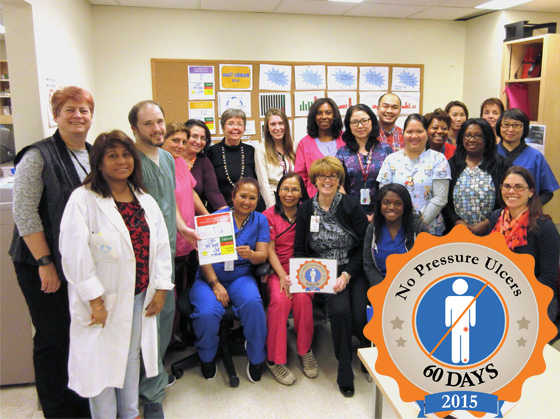
The 5A team cares for a patient population particularly susceptible to pressure ulcers. (Photo: UHN)
It was a moment three-and-a-half years in the making.
The team on 5A at Toronto Western Hospital (TWH) recently celebrated 60 days without any patient developing a pressure ulcer. It's a first for the team, and for UHN.
And it's particularly impressive given the limited mobility of the spinal injury patients the unit treats.
Pressure ulcers occur when the skin breaks down due to prolonged immobility. They are painful and notoriously difficult to heal once they develop, but completely preventable.
"We work very hard to be preventative and proactive," Rosemary Ritchie, manager, TWH, says in explaining how her team was able to reach this milestone. "We discuss every patient that comes on to our unit during our daily huddles.
"If they are deemed at risk of developing a pressure ulcer, a fall or a urinary tract infection, we flag them on our risk board and act immediately by involving other members of the team or employing the necessary equipment to prevent harm."
Risk board
Rosemary credits her team with coming up with the idea for the risk board and says it has become a part of the staff's practice. Team members update the board automatically whenever a patient arrives or they conduct a skin assessment rather, than waiting for the huddle.
"We also realized that to prevent pressure ulcers we needed to better educate patients and families on what happens if they don't turn, or move," says Rosemary. "These patients can be totally dependent on others for their movement, and may not always want to mobilize.
Educating them on why it is important to roll over or move to a chair helps us blend their comfort and safety."
'Don't give up'
Yvette Lashley, patient care coordinator, 5A, has one more piece of advice for the rest of UHN.
"Don't give up. It was a struggle at the beginning. It was hard to get people to come to huddles, and it was hard to see the value at times, but that work is paying off and we're seeing the results now," says Yvette. "The more involved people become, the more they see the importance of huddling daily and capturing the information we need to make improvements."
Janet Newton, Senior Clinical Director, TWH, credited the team for its "amazing work" and "truly making this focus part of their unit culture.
"This shows that a little focus every day can have a huge impact on outcomes for patients and allow staff to streamline the care they provide," Janet says.
